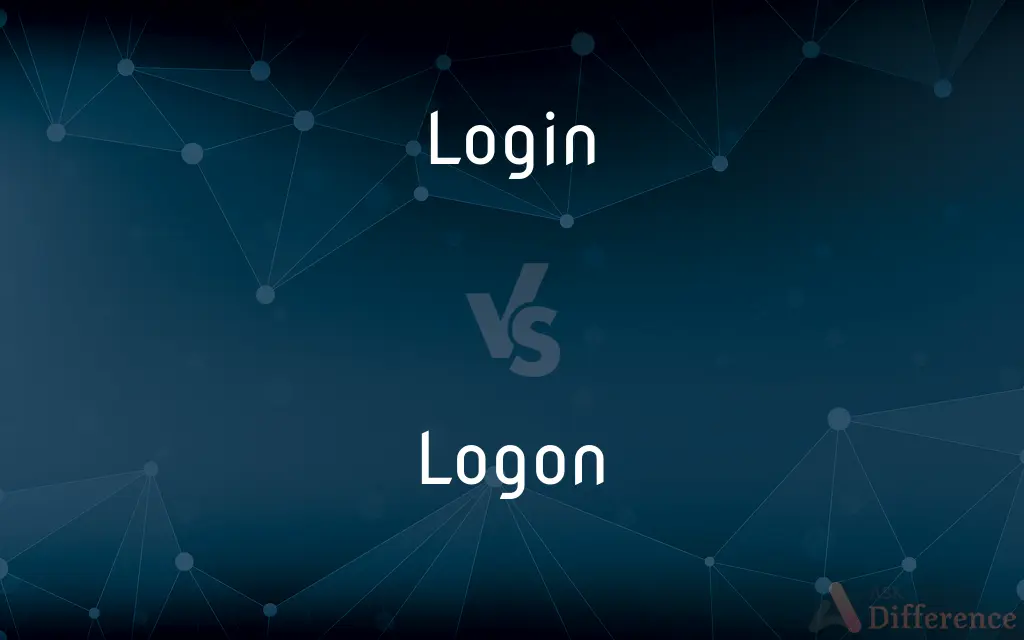Login vs. Logon — What's the Difference?
By Tayyaba Rehman — Updated on September 20, 2023
Login" and "Logon" both refer to the process of gaining access to a computer system or application. The terms are often used interchangeably, but "login" is more commonly used for web-based applications.

Difference Between Login and Logon
Table of Contents
ADVERTISEMENT
Key Differences
Both "Login" and "Logon" refer to the act of accessing a computer system, network, or website by entering credentials such as a username and password. However, "login" tends to be more associated with web-based applications and online services, while "logon" is often used in the context of enterprise-level systems or local computer networks.
While both "login" and "logon" serve essentially the same purpose, the usage can vary depending on the context. In general, people tend to use "login" when talking about email accounts, social media, or other websites requiring authentication. "Logon," on the other hand, is more commonly used when discussing operating systems, databases, and corporate networks.
In terms of etymology, both "login" and "logon" are contractions. "Login" is a contraction of "log in," and "logon" is a contraction of "log on." However, the distinction between these two terms is increasingly blurred as technology evolves, making them largely synonymous in contemporary usage.
Even though "login" and "logon" may be used interchangeably, there are slight nuances that some might argue are worth noting. For example, in a technical setting, "logon" could imply a more complex authentication process involving multiple layers of security. "Login," by contrast, is often thought to pertain to simpler, more straightforward methods of authentication.
Comparison Chart
Common Usage
Web-based apps
Enterprise systems
ADVERTISEMENT
Etymology
"log in"
"log on"
Context
Email, social media
Operating systems, databases
Complexity
Simpler
Possibly multi-layered
Synonymity
Often used as a synonym
Often used as a synonym
Compare with Definitions
Login
The act of initiating a user session.
After a successful login, you will be redirected to your dashboard.
Logon
The credentials used for entering a computer system.
Your logon ID should never be shared.
Login
The process of gaining access to a web-based application.
I forgot my login credentials for the website.
Logon
The act of accessing a computer system or network.
The logon process for the network requires two-factor authentication.
Login
The credentials used for authentication on a website.
Your login should be secure and unique.
Logon
Initiating a user session in a more complex system.
After the logon process, you will have access to various company resources.
Login
A user interface for entering credentials.
The login page of the website has been updated.
Logon
To enter a system or network by proving your identity.
You will be prompted to logon upon restarting the computer.
Login
To enter an application or system by providing necessary credentials.
You need to login to access these resources.
Logon
A user interface specifically for authentication in systems.
The logon screen for Windows has several security features.
Login
In computer security, logging in (or logging on, signing in, or signing on) is the process by which an individual gains access to a computer system by identifying and authenticating themselves. The user credentials are typically some form of "username" and a matching "password", and these credentials themselves are sometimes referred to as a login (or logon, sign-in, sign-on).
Logon
Variant of login.
Login
The process of identifying oneself to a computer, usually by entering one's username and password.
Logon
(computing) A combination of a user's identification and password used to enter a computer.
Using the same logon for different systems can be a security risk.
Login
A username.
Logon
(computing) The process of logging on.
The user's desktop is displayed shortly after logon.
Login
(computing) A combination of a user's identification and password used to enter a computer, program, network, etc.
I've forgotten my login again.
Login
(computing) The process of logging in.
Your login failed because you weren't connected to the office network.
Common Curiosities
What is a Login?
Login refers to the process of gaining access to a web-based application by entering credentials.
What is a Login page?
A login page is a user interface where you can enter your login credentials.
Is a Login always a manual process?
No, some systems allow automatic login based on saved credentials.
What is a Logon?
Logon refers to the act of accessing a computer system or network by providing credentials.
Is Login web-specific?
Login is commonly used for web-based applications but can also refer to other systems.
What credentials are needed for a Login?
Typically, a username and password are required for login.
What credentials are needed for a Logon?
A username and password are often required, but additional security layers might be present.
Is Login simpler than Logon?
Login often refers to simpler authentication methods, while logon might involve more complex security layers.
Is Logon limited to enterprise settings?
Logon is often used in enterprise settings but can apply to any system requiring authentication.
Can I use Login and Logon interchangeably?
While not strict, they are often used interchangeably; however, context might dictate preference.
What is a Logon screen?
A logon screen is a user interface, often part of an operating system, where you can enter your logon credentials.
What is the etymology of Login?
Login is a contraction of "log in."
What is the etymology of Logon?
Logon is a contraction of "log on."
Which term is older, Login or Logon?
Both terms evolved around the same time with the development of computer systems requiring user authentication.
Is a Logon always a manual process?
Logon can be automated, especially in systems that use single sign-on technologies.
Share Your Discovery

Previous Comparison
Criminal vs. Swat
Next Comparison
Fog vs. MistAuthor Spotlight
Written by
Tayyaba RehmanTayyaba Rehman is a distinguished writer, currently serving as a primary contributor to askdifference.com. As a researcher in semantics and etymology, Tayyaba's passion for the complexity of languages and their distinctions has found a perfect home on the platform. Tayyaba delves into the intricacies of language, distinguishing between commonly confused words and phrases, thereby providing clarity for readers worldwide.















































